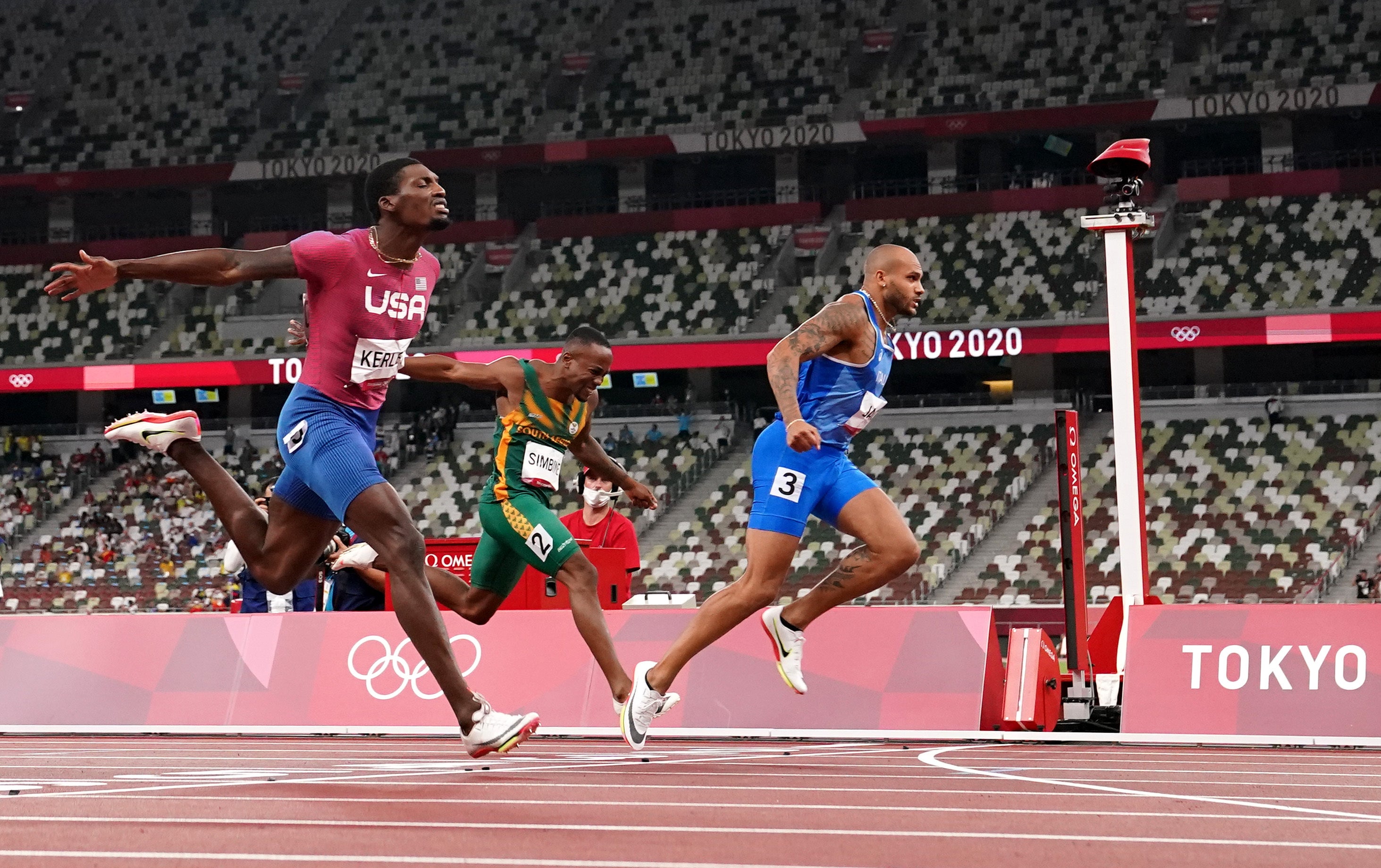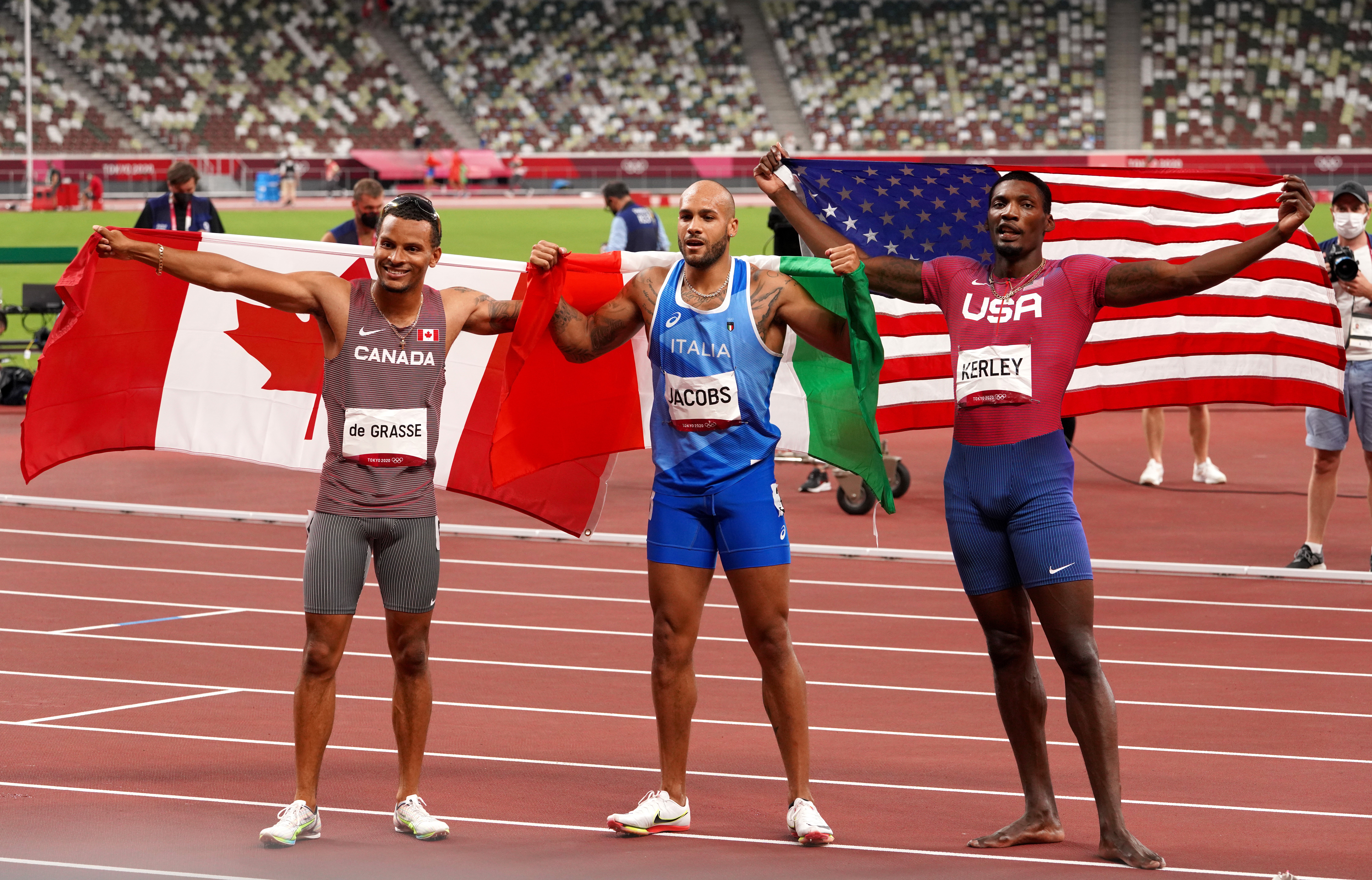Tokyo Olympics: Italian former long jumper Marcell Jacobs stuns field to win men’s 100m final
Marcell Jacobs took a surprise gold in Tokyo ahead of America’s Fred Kerley and Canada’s Andre de Grasse in the most open 100m men’s race in years

Your support helps us to tell the story
From reproductive rights to climate change to Big Tech, The Independent is on the ground when the story is developing. Whether it's investigating the financials of Elon Musk's pro-Trump PAC or producing our latest documentary, 'The A Word', which shines a light on the American women fighting for reproductive rights, we know how important it is to parse out the facts from the messaging.
At such a critical moment in US history, we need reporters on the ground. Your donation allows us to keep sending journalists to speak to both sides of the story.
The Independent is trusted by Americans across the entire political spectrum. And unlike many other quality news outlets, we choose not to lock Americans out of our reporting and analysis with paywalls. We believe quality journalism should be available to everyone, paid for by those who can afford it.
Your support makes all the difference.It was a measure of the void at the top of men’s sprinting since Usain Bolt retired that the first Olympic 100m final without him for 17 years featured an unpredictable hodge-podge of athletes, including 60m specialists and 400m runners, and in the end an Italian long jumper won. “I’ve won an Olympic gold after Bolt, it’s unbelievable,” said Marcell Jacobs of his first major title. “Tonight, staring at the ceiling, perhaps I will realise.”
The first thing Jacobs did when he became Olympic champion was to call for an Italian flag, with a wonderfully Italian hand gesture. Born in America to a Texan father before moving to Brescia with his Italian mother, Jacobs has faced questions about his national allegiance and he has always answered the same way, with conviction, that he feels “100 per cent Italian”. If only he had been so decisive about his athletics, he might have got here sooner.
Up until last year the 26-year-old had split his energy between sprinting and long jump; on most official websites you find him listed as a jumper first. That might change now after he conquered the most open men’s 100m final for decades to win in impressive style, delivering a national record 9.80 as he pulled away from America’s Fred Kerley who won silver in 9.84. Canada’s Andre de Grasse surged late to clock 9.89 and take bronze, just as he did in Rio five years ago.
“I really didn’t know anything about him,” Kerley said of Jacobs. “It was my first time racing him at the Monaco Diamond League [in July]. Everybody’s a threat when you get to the final, everybody. He did a fantastic job.” Even after the race, De Grasse still seemed unsure of his name. “It’s crazy when everyone runs so fast – 9.80 from the Italian guy, I didn’t expect that. I thought my main competition would have been the Americans, but definitely he came to play. He executed. He did his thing so congrats to him.”
Jacobs was dumped out of the semi-finals at the 2019 worlds with a time of 10.20, but his switch to focus solely on 100m quickly bore fruit. He ran 10.10 last year in Italy and then broke the 10-sec barrier for the first time in May. In Tokyo he put together the kind of championship every athlete dreams of, posting personal bests in each round with a 9.94 heat and 9.84 in the semi-finals, before the performance of a lifetime.

For a while Bolt’s place at the top of men’s sprinting had appeared to be filled by world champion Christian Coleman until he was banned for anti-doping violations. Then came Trayvon Bromell, the American who ran a sensational 9.77 in June, but he looked out of sorts here and failed to qualify for the final. So as they lined up on the start, the winner was anyone’s guess.
This was no longer about talent: most of the finalists had similar personal bests. Nor was it about reputation: there wasn’t the palpable ego of a Maurice Greene prowling in his lane, nor the aura of a Bolt to win the race before it had started. This came down to nerve and Jacobs had it.
After 50m it was a straight fight between two towering muscle men, Jacobs and the 27-year-old Kerley, whose previous career highlight was world 400m bronze. Kerley led at halfway but as he strained every sinew, veins throbbing, Jacobs relaxed back into his stance like an armchair. He went past his rival and kept accelerating before clenching his fists in delight as he crossed the line.
He fell into the skinny arms of Gianmarco Tamberi, the Italian high jumper who minutes earlier had secured a shared gold with Qatar’s Mutaz Barshim. On Italy’s very own Super Sunday, both jumpers had cleared every attempt up to 2.37m without fault, and both missed all three attempts at the Olympic record of 2.39. They congratulated each other, more than satisfied to share glory, and Tamberi howled with joy. There was no crowd of course, but a sizeable contingent from Italian athletics made a racket as they hailed an unforgettable night.
“When I got to Gianmarco we support each other,” Jacobs said. “We all know his story, he could have won in Rio but he had an injury, but being here together is something spectacular. I believe in him and believed in myself. It’s been my dream since I was a child. I need a week or so to understand what has happened. Seeing Gimbo [Tamberi] win the high jump gold fired me up a lot.”
For Great Britain there was disappointment as Zharnel Hughes was disqualified for a false start. He had had a warning after his teammate Reece Prescod was disqualified from the semi-final, but Hughes explained that a tweak in his calf had set him off, and must now rest for the 4x100m relay. “It wasn't pressure, I wasn’t nervous, it's just that my calf cramped up ... which is heartbreaking,” he said. “I’m really gutted right now. I just have to gather my thoughts right now and refocus.”
The outstanding performance of the evening came from Venezuela’s Yulimar Rojas. The double world champion broke the Olympic record with the very first attempt of the women’s triple jump final, then closed out the night by crushing the world record with an astonishing leap of 15.67m, surpassing the mark of Ukraine’s Inessa Kravets which had stood untouched since 1995.
As Rojas celebrated, the high jump returned to centre stage. After Tamberi secured gold he could be seen rolling on the floor revelling in the moment; since missing Rio it had been a long five years. Then the sprinters arrived. The stadium went dark and a light show danced across the 100m track, with dramatic music to ratchet up the tension, finishing with a searing bright image of the Olympic rings. Then a bang, and in less than 10 seconds it was over. Athletics has a new sprint king, and Jacobs has finally found his calling.
Join our commenting forum
Join thought-provoking conversations, follow other Independent readers and see their replies
Comments